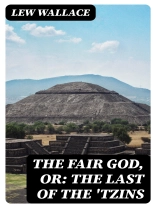In ‘The Fair God, or: The Last of the ‘Tzins, ‘ Lew Wallace delivers a sweeping historical novel set against the backdrop of the fall of the Aztec Empire. The narrative intricately weaves themes of love, honor, and cultural conflict, showcasing Wallace’s penchant for rich descriptions and character depth. Employing a vivid, romantic prose style, Wallace immerses the reader in the tumultuous landscape of Mesoamerica, where indigenous beliefs converge with the encroaching Spanish conquest, ultimately leading to a poignant exploration of identity and loss. As part of the broader context of 19th-century American literature, Wallace’s work reflects both the fascination with and the moral complexities of indigenous cultures and colonialism, offering a narrative that is as thought-provoking as it is entertaining. Lew Wallace, a Union general and a prominent lawyer, was deeply influenced by his diverse experiences, including his interactions with Native American communities and his own battle with faith and skepticism. These encounters enriched the depth of his storytelling, providing a personal lens through which he could examine the clash of civilizations. Wallace’s literary ambitions were further fueled by his desire to craft moral allegories, and ‘The Fair God’ serves as an embodiment of these principles, blending adventure with thoughtful introspection. This captivating novel is highly recommended for readers interested in historical fiction that probes profound themes of ethics and human experience. Wallace’s narrative not only captivates the imagination through its engaging storyline but also invites readers to reflect on the past’s complexities, making it a significant addition to the canon of American literature.
About the author
Lew Wallace was a multifaceted figure in American history—soldier, statesman, and author. Born on April 10, 1827, in Brookville, Indiana, Wallace showed an early interest in the arts but also pursued a military career. He reached the peak of military distinction during the American Civil War, though his legacy in that arena remains mixed, particularly due to his controversial role in the Battle of Shiloh. His statesman service included time as governor of the New Mexico Territory and as minister to the Ottoman Empire under President James A. Garfield.
Wallace’s literary contributions are significant, with his best-known work being ‘Ben-Hur: A Tale of the Christ’ (1880), a historical novel that gained immense popularity and has been adapted into several films. Another notable work is ‘The Fair God, or: The Last of the ‘Tzins’ (1873), a historical romance that explores the Spanish conquest of Mexico through the fictionalized narrative of the last Aztec emperor. Wallace’s writing style is marked by detailed historical descriptions, vivid characterizations, and an intricate weaving of personal and grand historical narratives. His books were a mixture of romanticized history and adventure, reflecting his deep interest in the past and the broader human condition. Wallace passed away on February 15, 1905, leaving behind a legacy as a unique American character whose life bridged the spheres of military, politics, and literature.












